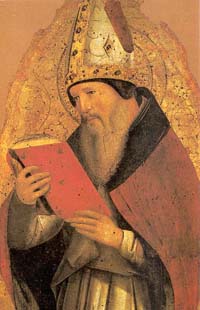
Saint Augustine
I. INTRODUCTION
Saint Augustine (354-430), greatest of the Latin Fathers and one of the most eminent Western Doctors of the Church.
Augustine was born on November 13, 354, in Tagaste, Numidia (now Souk-Ahras, Algeria). His father, Patricius (died about 371), was a pagan (later converted to Christianity), but his mother, Monica, was a devout Christian who labored untiringly for her son's conversion and who was canonized by the Roman Catholic church. Augustine was educated as a rhetorician in the former North African cities of Tagaste, Madaura, and Carthage. Between the ages of 15 and 30, he lived with a Carthaginian woman whose name is unknown; in 372 she bore him a son, whom he named Adeodatus, which is Latin for “the gift of God.”
II. INTELLECTUAL STRUGGLE
Inspired by the philosophical treatise Hortensius, by the Roman orator and statesman Marcus Tullius Cicero, Augustine became an earnest seeker after truth. He considered becoming a Christian, but experimented with several philosophical systems before finally entering the church. For nine years, from 373 until 382, he adhered to Manichaeism, a Persian dualistic philosophy then widely current in the Western Roman Empire. With its fundamental principle of conflict between good and evil, Manichaeism at first seemed to Augustine to correspond to experience and to furnish the most plausible hypothesis upon which to construct a philosophical and ethical system. Moreover, its moral code was not unpleasantly strict; Augustine later recorded in his Confessions:”Give me chastity and continence, but not just now.” Disillusioned by the impossibility of reconciling certain contradictory Manichaeist doctrines, Augustine abandoned this philosophy and turned to skepticism.
About 383 Augustine left Carthage for Rome, but a year later he went on to Milan as a teacher of rhetoric. There he came under the influence of the philosophy of Neoplatonism and also met the bishop of Milan, St. Ambrose, then the most distinguished ecclesiastic in Italy. Augustine presently was attracted again to Christianity. At last one day, according to his own account, he seemed to hear a voice, like that of a child, repeating, “Take up and read.” He interpreted this as a divine exhortation to open the Scriptures and read the first passage he happened to see. Accordingly, he opened to Romans 13:13-14, where he read: “...not in revelry and drunkenness, not in debauchery and licentiousness, not in quarreling and jealousy. But put on the Lord Jesus Christ, and make no provision for the flesh, to gratify its desires.” He immediately resolved to embrace Christianity. Along with his natural son, he was baptized by Ambrose on Easter Eve in 387. His mother, who had rejoined him in Italy, rejoiced at this answer to her prayers and hopes. She died soon afterward in Ostia.
III. BISHOP AND THEOLOGIAN
He returned to North Africa and was ordained in 391. He became bishop of Hippo (now Annaba, Algeria) in 395, an office he held until his death. It was a period of political and theological unrest, for while the barbarians pressed in upon the empire, even sacking Rome itself in 410, schism and heresy also threatened the church. Augustine threw himself wholeheartedly into the theological battle. Besides combating the Manichaean heresy, Augustine engaged in two great theological conflicts. One was with the Donatists, a sect that held the sacraments invalid unless administered by sinless ecclesiastics. The other conflict was with the Pelagians, followers of a contemporary British monk who denied the doctrine of original sin. In the course of this conflict, which was long and bitter, Augustine developed his doctrines of original sin and divine grace, divine sovereignty, and predestination. The Roman Catholic church has found special satisfaction in the institutional or ecclesiastical aspects of the doctrines of St. Augustine; Roman Catholic and Protestant theology alike are largely based on their more purely theological aspects. John Calvin and Martin Luther, leaders of the Reformation, were both close students of Augustine.
Augustine's doctrine stood between the extremes of Pelagianism and Manichaeism. Against Pelagian doctrine, he held that human spiritual disobedience had resulted in a state of sin that human nature was powerless to change. In his theology, men and women are saved by the gift of divine grace; against Manichaeism he vigorously defended the place of free will in cooperation with grace. Augustine died at Hippo, August 28, 430. His feast day is August 28.
Source: Microsoft Encarta Encyclopaedia 2006

نظر